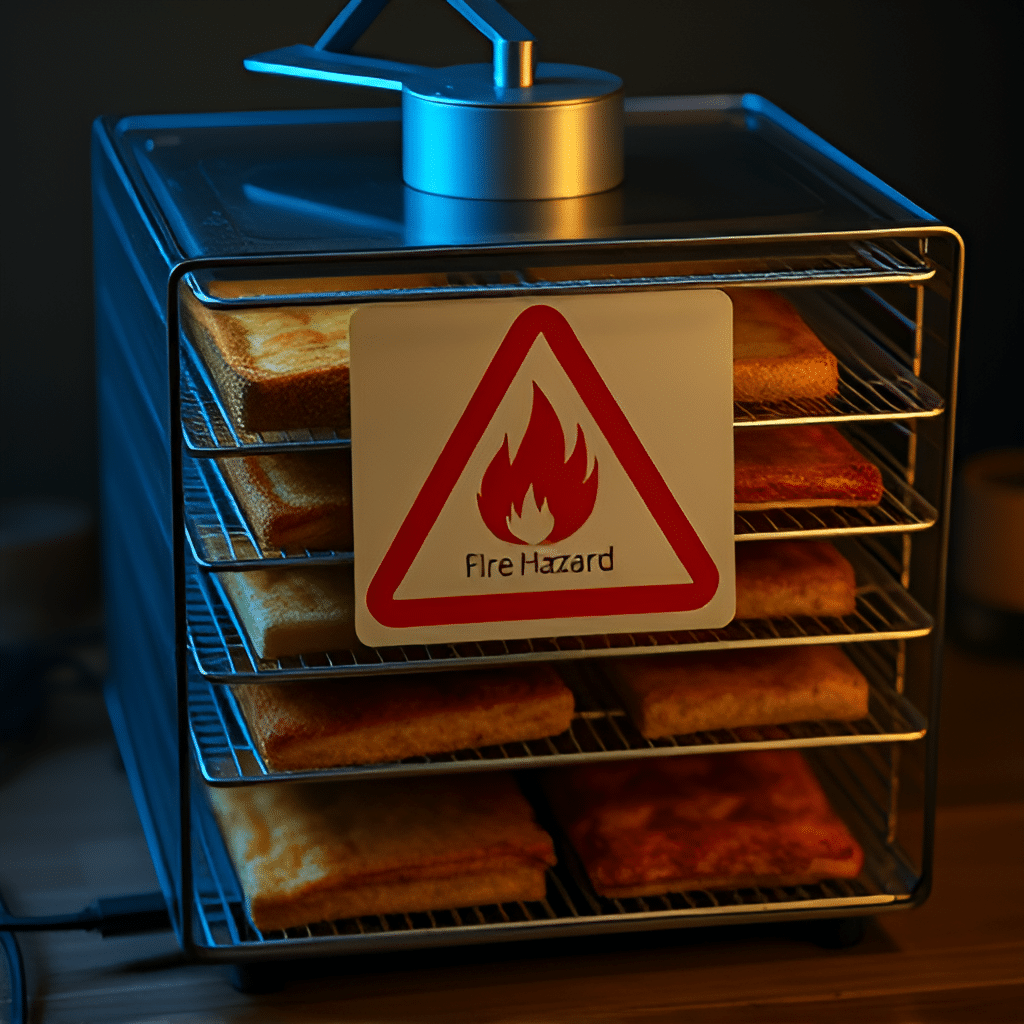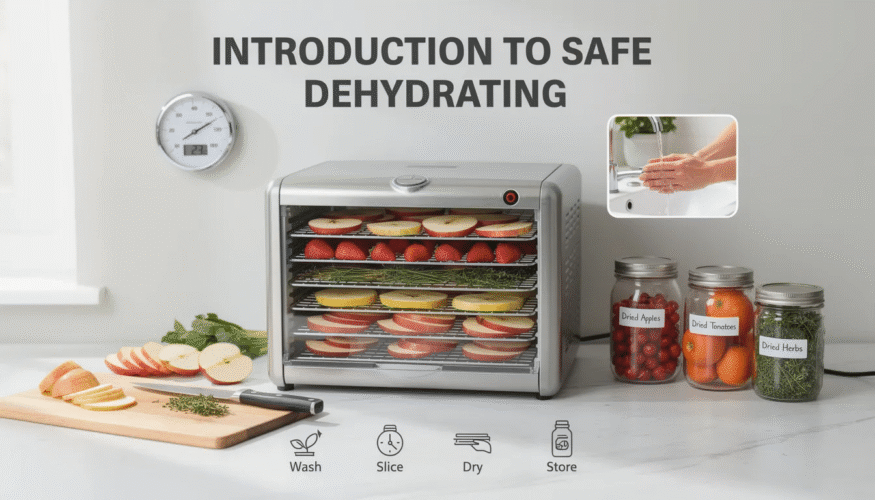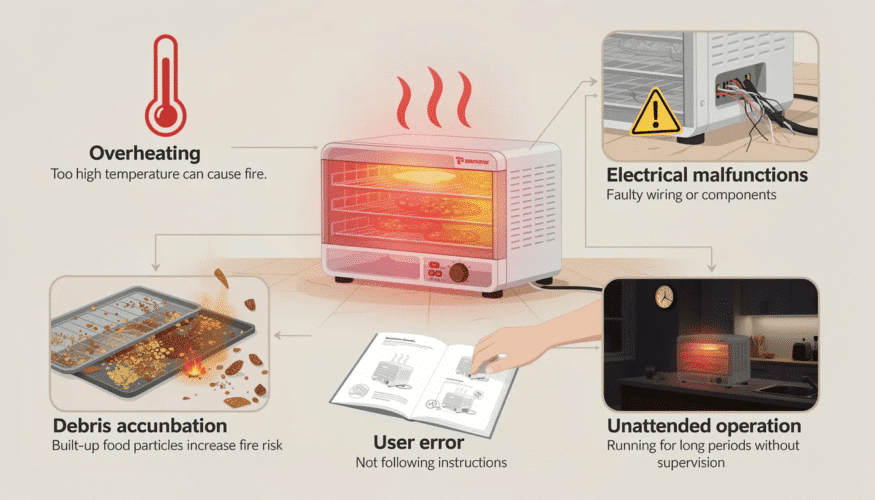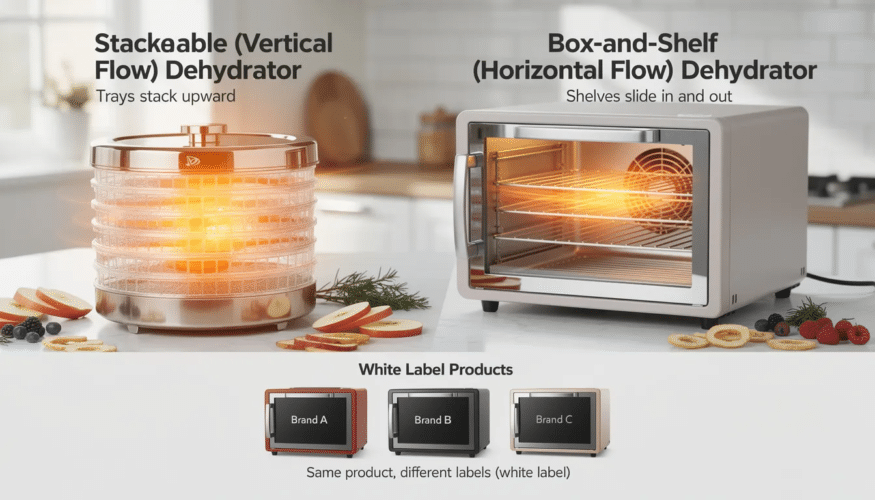


Can a Dehydrator Start a Fire? Understanding the Risk and How to Stay Safe While Drying Food
Can a dehydrator start a fire? This is a crucial question for home cooks and anyone using a
Use caution when operating a dehydrator, as improper use can increase the risk of fire hazards and other safety concerns.
Food dehydrators are handy gadgets for dehydrating a wide variety of foods for snacks and meals, such as drying fruits, veggies, and more. Bananas are a popular fruit for dehydration, especially for making banana chips, thanks to their availability and suitability for creating tasty snacks. Dehydrators are also commonly used for making jerky and other dehydrated snacks, offering a convenient way to preserve food at home. But safety is key. While they are generally safe, like any electric device, there’s a chance of fire if not used right. Can a dehydrator start a fire? Yes—fires can be caused by electrical appliances, including dehydrators, especially if left plugged in or used improperly. Overheating, placing it too close to flammable things, or ignoring the manufacturer’s instructions can lead to trouble. Imagine leaving your dehydrator unattended and it malfunctions—this could result in a dangerous situation. Keeping your dehydrator clean and well-maintained is a must, as a neglected appliance could end up posing a fire hazard.
Why does this matter? Overheating, electrical malfunctions, and debris accumulation are primary factors that can cause a fire in a
Let’s get into the nitty-gritty of using your dehydrator safely, starting with the basics and moving into specific risks, types of appliances, and recent recalls.
Introduction to Safe Dehydrating

Using a food dehydrator is a fantastic way to preserve your favorite fruits, vegetables, and meats, helping you extend the shelf life of foods and reduce waste. These handy appliances work by removing moisture, making it easier to store healthy snacks and ingredients for months. But as with any electric appliance, food dehydrators come with certain risks—including concerns about whether they are expensive to run, which depends on factors like your local electric rates, the cost of electricity, and the wattage of your dehydrator—especially if they’re not used according to the manufacturer’s instructions.
While food dehydrators are generally safe, it’s important to remember that improper use can create a fire hazard. To dehydrate food safely, always monitor the temperature settings and avoid overloading the trays. Leaving a dehydrator unattended for long hours increases the risk of fire, so it’s best to check on your appliance regularly. However, it is generally safe to leave a dehydrator on overnight, provided some guidelines are followed, such as ensuring proper ventilation and keeping it away from flammable materials. Be alert for warning signs like overheating, unusual smells, or any signs of smoke—these could indicate a potential fire risk. If you notice anything unusual, turn off the dehydrator right away to prevent property damage.
Fire safety is essential when using any electric appliance. Make sure you have a working fire alarm in the same room as your dehydrator, and keep a fire extinguisher nearby just in case. It is also important to have working smoke alarms in the kitchen to provide early warning in case of fire. Regular cleaning and maintenance are also crucial—removing sticky residue and food debris helps prevent overheating and reduces the risk of fires.
When shopping for a new food dehydrator, look for models with built-in safety features like automatic shut-off and heat-resistant materials. Check the company’s recall history and read reviews from other consumers to ensure you’re choosing a reliable product. Consider the broader financial impact and safety-related costs associated with recalled consumer products, as these can have significant economic implications and safety hazards. If you ever experience an incident or have concerns about fire hazards, report it to the company and contact the manufacturer for support.
Safe dehydrating is all about following the user manual, monitoring your appliance, and staying aware of potential hazards. By taking these simple precautions, you can enjoy the many benefits offood dehydrators—delicious, healthy snacks and preserved foods—while benefiting from the advantages of dehydrating food for storage and convenience and the best foods to dehydrate for long-term storage without worry. Some dehydrator models, such as those with horizontal airflow, help preserve distinct flavors and prevent flavor mixing between different foods. You can set up a dehydrator to run overnight if the foods can take that long to dry, but always ensure you follow safety guidelines.
When your food is done dehydrating, carefully remove the dried items from the trays to avoid damaging the product or the equipment. Dehydrated meals are fine for storage and use, especially for short-term needs or immediate consumption. For longer-term storage and to avoid issues that can occur if you over dehydrate food, place dehydrated or prepared foods in a refrigerator or freezer to help prevent spoilage or bacterial growth.
When drying strong-smelling foods like peppers or aromatics, it’s best to do so outside or in a well-ventilated area, as their fumes can be irritating, especially for individuals with lung issues.
There are many online resources available for beginners to learn about safe dehydrating practices, including a beginner’s guide on using a food dehydrator and a guide to understanding and using a food dehydration chart, plus other support materials to help you get started.
Next, let’s break down the specific fire risks you need to know about when using a
Understanding the Risks

Fire Hazards
Overheating, electrical malfunctions, and debris accumulation are primary factors that can cause a fire in a
- Overheating: When the dehydrator gets too hot, it can become a fire hazard. (Overheating is a primary factor that can cause a fire in a
food dehydrator .) - Electrical malfunctions: Problems with wiring or components can contribute to fires in food dehydrators.
- Debris accumulation: Food particles or residue left inside the dehydrator can increase the risk of fire.
- User error: Inattentiveness or not following instructions can lead to fire incidents.
- Unattended operation: Leaving the dehydrator running for extended periods, especially with long drying times, increases fire risk.
These risks matter because overheating, electrical malfunctions, and debris accumulation can directly cause a fire in a
Cleaning and Maintenance
Keeping your dehydrator clean and in good shape is a big step toward staying safe. A clean machine is less likely to catch fire. Always check for loose wires or connections during maintenance.
Placement and Surface
Where you put your dehydrator matters. Placing the dehydrator on a counter is recommended for safety. Keep it away from flammable stuff like curtains or wood surfaces. Give it space to breathe.
Electrical Safety
If your dehydrator has any electrical problems, don’t use it. Fix it first to avoid any fire risk. Safety is a serious matter for your house and family.
Now that you know the main risks, let’s look at the different types of dehydrators and how their design affects safety. If you’re focusing on produce, understanding the best vegetables for food dehydration can also help you plan safe, efficient drying sessions.
Recent Recalls and Fire Incidents
In recent years, some food dehydrators have been recalled due to fire and burn hazards, including models from Greenfield World Trade. Specifically, Greenfield World Trade recalled 2,400 units of its Excalibur EZ DRY
To identify food dehydrators recalled for fire hazards, check the model number and date code printed on the label, usually found on the back or bottom of the unit. This information helps determine if your appliance is part of a recall. Recall details, including affected model numbers and date codes, are available on the manufacturer’s recall page online. Some recalled units were sold in September, so pay attention to the purchase date. Greenfield World Trade, the manufacturer, is based in Fort Lauderdale, Fla., which is often listed in recall notices for location reference.
With these real-world examples in mind, let’s move on to the different types of dehydrators and how their design can affect safety.
Types of Appliances

When it comes to food dehydrators, not all kit is made the same—especially when you’re thinking about fire safety or looking for the best budget food dehydrators for home use. There are two main types you’ll come across in most kitchens: stackable (also called round or vertical flow) dehydrators and box-and-shelf (horizontal flow) dehydrators. Each has its own setup, and that can make a difference in how you use and keep an eye on them for safety.
It’s also important to note that some dehydrators are white label products, meaning they are manufactured by one company and sold under various brand names. This can affect recall and safety information, as the same product may appear under different labels.
Stackable Dehydrators
Stackable dehydrators have trays that stack on top of each other, with a heating element and fan usually tucked away at the base or top, making them popular vegetable dehydrator machines for home kitchens. Air moves vertically through the trays, drying your fruits, veggies, or jerky. These models are often compact and can be easier to tuck away, but they sometimes have less even airflow. If food or oils drip down onto the heating element, it can bump up the risk of overheating or even catching fire—especially if the trays aren’t sorted properly or if the appliance is packed to the gills.
Box-and-Shelf Dehydrators
Box-and-shelf dehydrators (like many Excalibur models) look more like a small oven, with trays that slide in horizontally and a heating element at the back. This setup usually gives you better air circulation and more consistent drying. Metal trays and housing can be more solid and less likely to get heat damage than plastic, but it’s still important to keep vents clear and make sure the appliance is sitting in a cool, well-ventilated spot.
Safety Features
Some dehydrators come with extra safety features, such as built-in timers, automatic shut-off, or temperature controls. These can help cut down the risk of overheating if you forget to switch off the appliance or if you need to run it for long stretches—like when drying thick slices of produce or making jerky overnight. Models with digital displays and alarms can also make it easier to keep tabs on the drying process and spot any signs of trouble early on.
When choosing a food dehydrator, look for one with a solid build, clear instructions, and safety certifications. Make sure the trays fit snugly, the vents are easy to clean, and the heating element is well-protected from drips or bits and pieces. Always give the manual a read to get your head around how your specific model works, and never leave the appliance plugged in or running unattended for longer than what’s recommended.
By picking the right type of dehydrator and using it properly, you can enjoy delicious dried foods without worrying about fire hazards.
Next, let’s review the best practices for safe operation and maintenance of your dehydrator.
Safety Precautions for Safe Operation
Placement and Ventilation
- Place your
food dehydrator on a hard, heat-resistant, and non-combustible surface, such as a countertop or table. - Ensure proper ventilation around the
food dehydrator to prevent overheating and reduce the risk of fire. - Keep the
food dehydrator away from flammable materials, such as curtains, towels, and wood surfaces.
Regular Inspection
- Regularly inspect the
food dehydrator for signs of wear and tear, and replace any damaged parts. - Watch for electrical issues—if your dehydrator has any electrical problems, do not use it until it is repaired.
Safe Operation
- Always follow the manufacturer’s instructions for temperature settings, load capacity, and safe operation.
- Never leave the food dehydrator running unattended for extended periods, especially with long drying times.
- Be alert for warning signs like overheating, unusual smells, or any signs of smoke—these could indicate a potential fire risk.
Now, let’s look at how proper use and maintenance can further reduce fire risks.
Preventing Fires with Proper Use and Maintenance
Cleaning and Maintenance
- Keep the
food dehydrator clean and free of debris to prevent overheating and reduce the risk of fire. - Regularly clean trays, fans, and heating elements to remove food particles and residue.
Manufacturer Recalls
- Check your
food dehydrator for any recalls, such as the Greenfield World Trade recall, and follow the recall safety information link for instructions. - Contact Greenfield World Trade or the manufacturer if you have any concerns or need replacement parts or support with your food dehydrator’s safety.
With these safety tips in mind, you’re ready to use your dehydrator with confidence. Let’s wrap up with a quick-reference checklist for your safety.
Troubleshooting and Repair
Even the best food dehydrators can run into problems from time to time, but knowing how to troubleshoot and repair your appliance can help keep your home and food safe. If you notice signs like unusual noises, inconsistent temperatures, or the dehydrator shutting off unexpectedly, it’s important to act quickly. Start by unplugging the dehydrator and consulting the manufacturer’s instructions for troubleshooting tips. Many common issues, such as overheating or faulty temperature controls, can be resolved by cleaning the appliance, checking for loose connections, or replacing worn-out parts.
If the problem persists or you spot any signs of electrical malfunction—like a burning smell, visible damage to the cord, or the unit getting excessively hot—immediately stop using the dehydrator. Safety should always come first. Contact the manufacturer, consult a guide to common issues with food dehydrators, or reach out to a qualified repair professional for guidance. For example, if your
Regular maintenance is key to preventing issues before they start. Clean your dehydrator after each use, inspect it for wear and tear, and make sure all parts are in good working order. By staying alert to potential problems and addressing them promptly, you can ensure your dehydrator remains a safe and reliable tool for dehydrating food at home.
Dehydrating Food: The Safe Process
Dehydrating food is a fantastic way to extend the shelf life of your favorite fruits, vegetables, and even meats, all while keeping your pantry stocked with healthy snacks. To dehydrate food safely, start by selecting a
Arrange the food in a single layer on the dehydrator trays, making sure there’s enough space for air to circulate. Set the temperature and timer according to the manufacturer’s instructions, as different foods require different drying times and temperatures. Throughout the process, keep an eye on the dehydrator to ensure it’s running smoothly and not overheating. Avoid placing the appliance near flammable materials, and always use it on a stable, heat-resistant surface to reduce the risk of house fires.
Once your food is fully dried, let it cool before transferring it to airtight containers. This helps prevent moisture from getting in and keeps your dehydrated food fresh for longer. Store your dried fruits, vegetables, and snacks in a cool, dry place, or in the refrigerator for even longer shelf life. Regularly clean your dehydrator and check for any signs of wear or damage, especially if you’re using an older model or one that’s been subject to a recall. By following these safe practices and staying aware of potential risks, you can enjoy delicious, homemade dehydrated food while keeping your house and family safe from fire hazards and injuries.
Wrapping It Up
So, can a dehydrator catch on fire? It’s not something you want to think about, but it’s good to know. Stick to the basics: keep your dehydrator clean, follow the manufacturer’s instructions, and give it some space to breathe. If there’s a recall, like the ones from Greenfield World Trade, check it out and see if your model is affected. Consumers should stop using the recalled EZ DRY food dehydrators and contact Greenfield World Trade for a refund. Remember, safety comes first. With these tips, you can use your
We hope this information helps you use your dehydrator safely and confidently.
Quick-Reference Checklist: Fire Risks and Safety Precautions
| Main Fire Risks | Safety Precautions |
|---|---|
| Overheating | Regular cleaning of trays, fans, and heating elements |
| Electrical malfunctions | Inspect electrical components for damage before use |
| Debris accumulation | Remove food particles and residue after each use |
| User error (inattentiveness) | Follow manufacturer’s instructions for temperature and load capacity |
| Unattended operation | Do not leave dehydrator running for extended periods, especially overnight |
| Improper placement | Place on a heat-resistant, non-combustible surface with proper ventilation |
| Recalled or faulty models | Check for recalls and stop using affected models; contact manufacturer for guidance |
Fact References:
- Overheating is a primary factor that can cause a fire in a
food dehydrator . - Electrical malfunctions can contribute to fires in food dehydrators.
- Debris accumulation inside food dehydrators can increase the risk of fire.
- User error, such as inattentiveness, can lead to fire incidents with food dehydrators.
- Food dehydrators should be cleaned regularly to ensure safe operation and reduce fire hazards.
- Food dehydrators should not be left unattended for extended periods to minimize fire risk.
- You should not leave the dehydrator unattended for extended periods, especially with long drying times.
- Inspecting electrical components for damage is an essential precaution for safe dehydrator use.
- Following the manufacturer’s instructions for temperature settings and load capacity is crucial when using a dehydrator.
- It is important to place the dehydrator on a heat-resistant and non-combustible surface.
- Greenfield World Trade recalled 2,400 units of its Excalibur EZ DRY
food dehydrator due to a fire hazard. - The Excalibur EZ DRY
food dehydrator overheated and caused incidents of property damage and minor burn injuries. - Consumers should stop using the recalled EZ DRY food dehydrators and contact Greenfield World Trade for a refund.
- The recalled food dehydrators were sold from November 2016 through February 2019.
- The EZDRY and TrueTimber food dehydrators can overheat and pose a fire and burn hazard.

